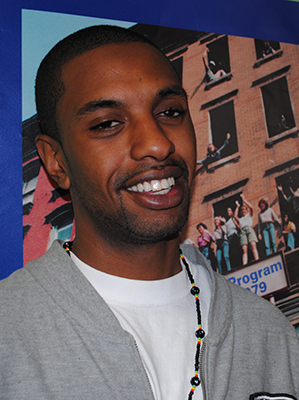Youth Voices: Why I Joined my SAG

This past Tuesday night, I sat in a conference room at a juvenile detention facility here in Boston. I was scared a little overwhelmed, but not because I was being adjudicated. Instead, I was at a table with city officials and heads of state agencies—people who could casually talk about meetings with the Governor. I was there because I want to be a member of the Massachusetts Juvenile Justice Committee, our State Advisory Group (SAG) that oversees our juvenile justice system. I had contacted several people, sent lots of emails and made phone calls in order to get a seat at this table.
Under the federal Juvenile Justice and Delinquency Prevention Act (JJDPA), each state must have a SAG to guide and monitor juvenile justice programs and ensure compliance with the core standards of the JJDPA. At least 20 percent of SAG members must be young people—and I’m aiming to be one of them.
How I Got Here
I first learned about State Advisory Groups (SAGs) at the Coalition for Juvenile Justice Youth Summit in August. My first thought was, how can I not get involved? I have a strong passion for criminal justice and am personally committed to “correcting the correctional systems.” That’s my motto. I don’t just mean behind the walls, I mean all aspects of juvenile and criminal justice: community supervision, parole and probation.
It stems from my experience in the system and the difficulties I experienced trying to get a job with a criminal background. And from losing friends and family; I lost my own father to the streets and gun violence. I believe that part of the solution is to fix the problems in the justice system—for example, the distrust between the police and community, the community feeling a need to take the law into their own hands, the police not solving crimes. These are things we see every day in our cities.
I first got involved with the courts when I caught a small drug case. I just wanted to make money, in part because I had to step up and provide for my family at a young age. I was 17 but got charged as an adult. Since then, state law has changed—they just raised the age of automatic transfer to the adult system—so if I were arrested today, I’d be in juvenile justice system and maybe connected to supports earlier.
As it was, I served a suspended sentence which meant I didn’t have to be in a prison or institution. Instead, I did community service and had two years of probation. I realized that if I kept getting arrested for minor things, I would be facing real time.
Street lifestyle is a revolving door. You make money fast and you lose it fast. There’s no big picture. I knew I needed a big picture. I got involved with YouthBuild, an alternative program that connects young people to education and skills training get themselves back on track; it is funded in part by the Office of Juvenile Justice and Delinquency Prevention (OJJDP) Mentoring Fund. (The OJJDP was another creation of the JJDPA.)
I now have my Associate’s degree and am about to get my Bachelor’s in criminal justice. Most people assume I want to be a cop. I tell them, I don’t know what the job title is, or what it looks like, but I want to be in a position where I’m having a direct influence on systems and policies, and through that, on people’s lives.
Joining the SAG is helping me move toward that. It’s a beginning for me.
Speaking Up, Having an Impact
At this first meeting, I felt a little out of the loop as a new guy. One of the presenters was the education program director for the Department of Youth Services (DYS). He talked about the state of education for young people in the system. He shared challenges, and we were able to suggest things they could try. I shared a little about the YouthBuild SMART initiative, which we piloted recently in Boston. It’s a traditional YouthBuild skills training model with some enhancements specific to court- and systems-involved youth.
I shared with him the results of the pilot, both what we did very well and the things we learned from. He said he thought this was great and wants to connect.
That’s a perfect example of why it matters that young people—and different types of people—be at the table. This could make a difference; whatever he and his department decide will likely be the model that is implemented statewide. Massachusetts is already a trailblazer in the education space in general, both in public school and justice system, and so it’s amazing to both learn from and maybe even influence that.
Seeing the Inside—from Both Sides
After the meeting ended, I got a personal tour from the Commissioner of the state Department of Youth Services. It was the first time I had been inside a juvenile detention center. You see how young people are living and being treated, it lights a fire and makes you want to hurry up and do something.
I had a lot of emotions. I knew people couldn’t make me out: is he one of us? One of them? I come from a family where being locked up is nothing out of the normal but still, just to be in the facility and to be interacting with the staff was wild.
Eyes on the Future
A big goal for me in being involved with our SAG, is that I want to help shift the paradigm of education in the justice system—from expectations that are at best GED or high school diploma to emphasizing college prep. If you want young people rehabilitated and back in their communities, they’ve got to be able to get real jobs. We’re competing with a lot of money on the street, so we need to get them in a position where they at least feel autonomous. We have to equip youth to actually succeed and make a new path.
Lashon’s Advice to Other Young Changemakers
Don’t let a record stop you: One thing I want to make clear is that if you have a background in the system, do not be discouraged. This can be your opportunity to change the way people who have been involved with the justice system are viewed and treated. Think about it: why should committees and groups keep pulling in young people to present here and there when you can have them at the table and part of the committee all the time?
Find your local SAG: To find a local SAG you can reach out to the Coalition for Juvenile Justice.
Network and don’t be shy: It sounds generic but it’s important: if you want change you have to take steps toward it yourself. I talked to a lot of different people about getting on the Committee. I just kept asking people. Next thing you know, I got an email asking me for my resume and a statement of interest.
Prepare: I wasn’t very in tune with the JJDPA—I didn’t know much about the law, so I did my research and got up to speed, which helped out in the meeting. I also checked out the agenda and looked up who was going to be speaking and what they do. At the meeting, I was nervous, but I listened and asked questions.
The JJDPA Matters: “I am all for the JJDPA, especially the provisions that make sure juveniles are rehabilitated and don’t end up influenced or intimidated by more severe criminals. I believe that the way the JJDPA protects young people is key to changing lives. In my case, that one year changed my life a little bit. If I had gotten locked up, I would have been completely derailed and wouldn’t have my Associate’s now.”
Not sure what a State Advisory Group is? Read about it here.
 Lashon Amado—who dropped out of high school “never thinking of college as an option”—is enrolled at University of Massachusetts Boston and working toward a future in Criminal Justice. A graduate of YouthBuild, Lashon is a member of the National Council of Young Leaders, and hopefully soon will be officially appointed by Governor Patrick as a member of the Massachusetts Juvenile Justice Committee.
Lashon Amado—who dropped out of high school “never thinking of college as an option”—is enrolled at University of Massachusetts Boston and working toward a future in Criminal Justice. A graduate of YouthBuild, Lashon is a member of the National Council of Young Leaders, and hopefully soon will be officially appointed by Governor Patrick as a member of the Massachusetts Juvenile Justice Committee.
This post is part of the JJDPA Matters blog, a project of the Act4JJ Campaign with help from SparkAction.
The JJDPA, the nation's landmark juvenile justice law, turns 40 this September. Each month leading up to this anniversary, Act4JJ member organizations and allies will post blogs on issues related to the JJDPA. To learn more and take action in support of JJDPA, visit the Act4JJ JJDPA Matters Action Center, powered by SparkAction.
- Tags: JJDPA, JJDPAMatters, Juvenile Justice, SAG, Youth Voices

